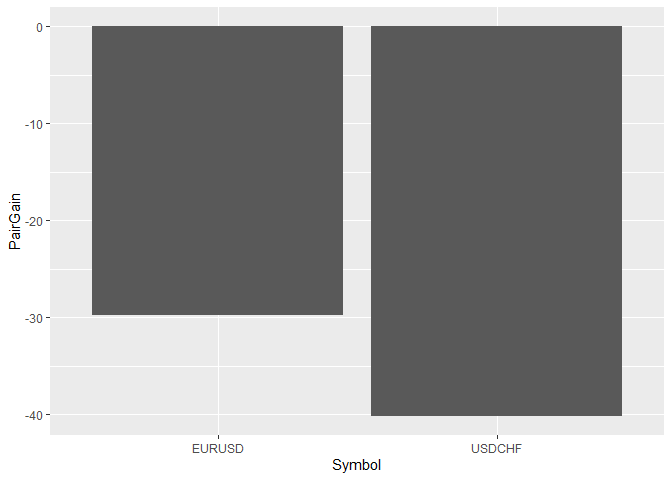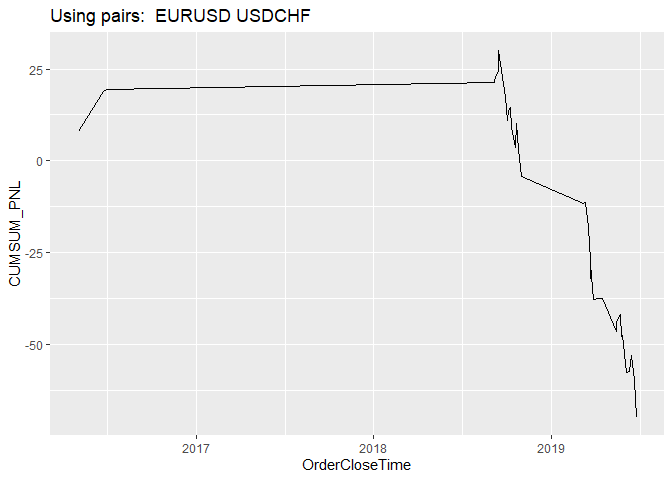Learn Computer and Data Science using Algorithmic Trading.
lazytrade
The goal of lazytrade is to keep all functions and scripts of the lazytrade educational project on UDEMY. Functions are providing an opportunity to learn Computer and Data Science using example of Algorithmic Trading. Please kindly not that this project was created for Educational Purposes only!
Installation
You can install the released version of lazytrade from CRAN with:
install.packages("lazytrade")
And the development version from GitHub with:
# install.packages("devtools")
devtools::install_github("vzhomeexperiments/lazytrade")
Several ideas explored in this package
- Data manipulation and analysis of performed trades results
- Reinforcement Learning for Automated Trading Risk Management
- Data manipulation and preparation for Machine Learning (transposing, aggregation, lagging, etc)
- Using Deep Learning for prediction of Market Types (Classification)
- Using Deep Learning for prediction of future price change (Regression)
- Strategy Tests simulations
- Utility functions to generate passwords, initialization files, encryption of passwords, etc
- Explored idea of building a model using random structures combined with an automated functional (strategy) test to improve model performance
- Overall, all functions have working examples with relevant documented sample data included in the package
Example - prepare data for machine learning
This is a basic example which shows you how to solve a common problem:
library(lazytrade)
library(magrittr, warn.conflicts = FALSE)
## basic example code
# Convert a time series vector to matrix with 64 columns
macd_m <- seq(1:1000) %>% as.data.frame() %>% to_m(20)
head(macd_m, 2)
#> [,1] [,2] [,3] [,4] [,5] [,6] [,7] [,8] [,9] [,10] [,11] [,12] [,13] [,14]
#> [1,] 1 2 3 4 5 6 7 8 9 10 11 12 13 14
#> [2,] 21 22 23 24 25 26 27 28 29 30 31 32 33 34
#> [,15] [,16] [,17] [,18] [,19] [,20]
#> [1,] 15 16 17 18 19 20
#> [2,] 35 36 37 38 39 40
Why is it useful? It is possible to convert time-series data into matrix data to do make modeling
Example - aggregate multiple log files and visualize results
Multiple log files could be joined into one data object
library(lazytrade)
library(readr)
library(dplyr)
#>
#> Attaching package: 'dplyr'
#> The following objects are masked from 'package:stats':
#>
#> filter, lag
#> The following objects are masked from 'package:base':
#>
#> intersect, setdiff, setequal, union
library(magrittr)
library(lubridate)
#>
#> Attaching package: 'lubridate'
#> The following objects are masked from 'package:base':
#>
#> date, intersect, setdiff, union
# files are located in the sample folders
DFOLDER <- system.file("extdata/RES", package = "lazytrade")
DFR <- opt_aggregate_results(path_data = DFOLDER)
This data object can be visualized
library(ggplot2)
opt_create_graphs(x = DFR, outp_path = dir,graph_type = 'bars')

Or just visualize results with time-series plot
opt_create_graphs(x = DFR, outp_path = dir,graph_type = 'ts')

Example - leverage Reinforcement Learning for Risk Management
Example below would generate RL policy based on the trade results achieved so far
library(dplyr)
library(ReinforcementLearning)
library(magrittr)
data(data_trades)
states <- c("tradewin", "tradeloss")
actions <- c("ON", "OFF")
control <- list(alpha = 0.7, gamma = 0.3, epsilon = 0.1)
rl_generate_policy(data_trades, states, actions, control)
#> TradeState Policy
#> tradeloss tradeloss ON
#> tradewin tradewin OFF
Example - generating passwords for trading platforms login
Multiple trading accounts require passwords, package contains function that may easily generate random passwords:
library(lazytrade)
library(stringr)
library(magrittr)
library(openssl)
library(readr)
#generate 8digit password for trading platform
util_generate_password(salt = 'random text')
#> .
#> 1 ac5cE049
Example - generate initialization files for MT4 platform
Facilitate generation of initialisation files:
library(lazytrade)
dir <- normalizePath(tempdir(),winslash = "/")
# test file to launch MT4 terminal with parameters
write_ini_file(mt4_Profile = "Default",
mt4_Login = "12345678",
mt4_Password = "password",
mt4_Server = "BrokerServerName",
dss_inifilepath = dir,
dss_inifilename = "prod_T1.ini",
dss_mode = "prod")
Notes to remind myself how to create R package
This readme file
What is special about using README.Rmd instead of just README.md? You can include R chunks like so:
summary(cars)
#> speed dist
#> Min. : 4.0 Min. : 2.00
#> 1st Qu.:12.0 1st Qu.: 26.00
#> Median :15.0 Median : 36.00
#> Mean :15.4 Mean : 42.98
#> 3rd Qu.:19.0 3rd Qu.: 56.00
#> Max. :25.0 Max. :120.00
You’ll still need to render README.Rmd regularly, to keep README.md up-to-date.
taken from https://r-pkgs.org/
Communicate about lifecycle changes
taken from https://lifecycle.r-lib.org/articles/communicate.html
Run Once:
usethis::use_lifecycle()
To insert badge:
Add badges in documentation topics by inserting one of:
#’ #’ #’
Generating Documentation
Title of the package
Create right title case for the title of the package By running this command… tools::toTitleCase("Learn computer and data science using algorithmic trading") the Title will become: “Learn Computer and Data Science using Algorithmic Trading”
Re-generating documentation
Run this code to re-generate documentation devtools::document()
Fixing License
Run this code to fix license: usethis::use_mit_license(name = "Vladimir Zhbanko")
Adding data to the package for internal tests
Run this code to add data to the folder data/x <- sample(1000)usethis::use_data(x)
To update this data: x <- sample(2000)usethis::use_data(x, overwrite = T)
To convert character into time: mutate(across('X1', ~ as.POSIXct(.x, format = "%Y.%m.%d %H:%M:%S")))
Note: use option ’LazyLoad` to make data available only when user wants it always include LazyData: true in your DESCRIPTION. Note: to document dataset see https://stackoverflow.com/questions/2310409/how-can-i-document-data-sets-with-roxygen
Document dataset using the R script R/datasets.R
Use data in the function with data(x)
Adding files to the package
Place data like small files to the folder: inst/extdata
Adding examples to test package function
Tests setup first time
Run this command to setup tests ‘usethis::use_testthat()’
This will create a folder with the name tests
Inside this folder there will be another folder testthat.
Examples in Roxygen code
@examples …
code to execute during package checks
@examples
/donttest{
code to NOT execute during package checks
}
Testing a package
Create a test script
Run this command to create a new script with the test skeleton:
usethis::use_test("profit_factor.R")
Enrich the test script
Details:
- add libraries used for test
- add function
context("profit_factor") - add function test_that(“test description”, {test process})
- load data using function
data(named_data_object)
Example:
library(testthat)
#>
#> Attaching package: 'testthat'
#> The following object is masked from 'package:dplyr':
#>
#> matches
#> The following objects are masked from 'package:readr':
#>
#> edition_get, local_edition
#> The following objects are masked from 'package:magrittr':
#>
#> equals, is_less_than, not
library(dplyr)
library(magrittr)
context("profit_factor")
test_that("test value of the calculation", {
data(profit_factor_data)
DF_Stats <- profit_factor_data %>%
group_by(X1) %>%
summarise(PnL = sum(X5),
NumTrades = n(),
PrFact = util_profit_factor(X5)) %>%
select(PrFact) %>%
head(1) %>%
pull(PrFact) %>%
round(3)
expect_equal(DF_Stats, 0.68)
})
#> Test passed 🎊
Test of the coverage for the script
Test coverage shows you what you’ve tested devtools::test_coverage_file()
devtools::test_coverage_file()
Automated checks
This will add automatic test coverage badge to the readme file on github usethis::use_coverage()
Checking package
Step 1. devtools::document() Step 2. devtools::run_examples() Step 3. Menu ‘Build’ Clean and Rebuild Step 4. ‘Check’ devtools::check()
Locally checking package with –run-donttest enabled
This is now a default option
Whenever examples construct is used author of the package must insure that those examples are running. Such examples are those that would require longer test execution. To perform this test package needs to be checked with the following command:
devtools::check(run_dont_test = TRUE)
whenever a quick check is required:
devtools::check(run_dont_test = FALSE) ???
Handling functions that write files
In case functions are writing files there are few considerations to take into account:
- examples section must contain working example of code that writes files
- example code must write to the temporary directory defined by
tempdir()function - after package check performed with
devtools::check()there should nothing remain in the ‘tmp/’ directory
Considerations
File names defined by function tempdir() would look like this:
# > tempdir()
# [1] "/tmp/RtmpkaFStZ"
File names defined by function tempfile() would look like this:
# > tempfile()
# [1] "/tmp/RtmpkaFStZ/file7a33be992b4"
This is example of how function write_csv example works:
tmp <- tempfile()
write_csv(mtcars, tmp)
results of this code are correctly stored to the temporary file
however this example from readr package function write_csv is showing that file will be written to the ‘/tmp/’ directory
dir <- tempdir()
write_tsv(mtcars, file.path(dir, "mtcars.tsv.gz"))
Deleting files after running examples:
We use function unlink() to do this:
unlink("/tmp/*.csv", recursive = TRUE, force = TRUE)
and we check that there is nothing more remained:
dir("/tmp/*.csv")
Delete deprecate functions
To remove function from the package we can use:
- Delete function from the folder (careful not to break other functions)
- Build -> More -> Document
- Build -> More -> Clean and Rebuild
- Build -> Check
CRAN Submission Tips and Tricks
Many notes while using global variables:
see see <https://github.com/HughParsonage/grattan/blob/master/R/zzz.R
Unfortunate note on specific flavors
After first submission there are some notes on specific R flavors
This question was addressed here but yet it’s not answered: https://stackoverflow.com/questions/48487541/r-cmd-check-note-namespace-in-imports-field-not-imported
To search for specific function in the scripts one can do the following:
list_of_functions <- c(
"drop_na",
"fill",
"extract",
"gather",
"nest",
"separate"
)
for (FN in list_of_functions) {
if(!exists("res")){
res <- BurStMisc::scriptSearch(FN)
} else {
res2 <- BurStMisc::scriptSearch(FN)
res <- mapply(c, res, res2, SIMPLIFY=FALSE)}
}
Define min R version
When functions are writing to the file
It’s important to avoid that function write to the directory other then tempdir() Construct file name must be done using file.name() function as follow:
# use plane temp directory
dir_name <- normalizePath(tempdir(),winslash = "/")
file_name <- paste0('my_file', 1, '.csv')
# this needs to be used in the function
full_path <- file.path(dir_name, file_name)
# when using sub-directory
sub_dir <- file.path(dir_name, "_SUB")
if(!dir.exists(sub_dir)){dir.create(sub_dir)}
Versioning of the package
https://r-pkgs.org/description.html#version
<major>.<minor>.<patch>
Test Environments
Clone package from GitHub and test check it in Docker Container
- started docker container vladdsm/docker-r-studio
- new project package
- clone from vzhomeexperiments/lazytrade.git
- use check button to pass the test
Build package
devtools::build()
Adding Readme Rmd
usethis::use_readme_rmd()
Automatic check with GitHub Actions
usethis::use_github_action()
To be elaborated
Upload package to CRAN
Setup the new version of the package:
usethis::use_release_issue()
Follow checklist before upload to CRAN:
devtools::release_checks()
then:
devtools::release()
before release checks
spelling devtools::spell_check()
checking on R hub
See ?rhubv2
checking with release
devtools::check_win_release()
checking win devel
devtools::check_win_devel()
checking win old devel
devtools::check_win_oldrelease()
check with rocker R in container
- use docker image with R Studio,
- clone repo, build, check package…
Update news.md file
Explain the changes
